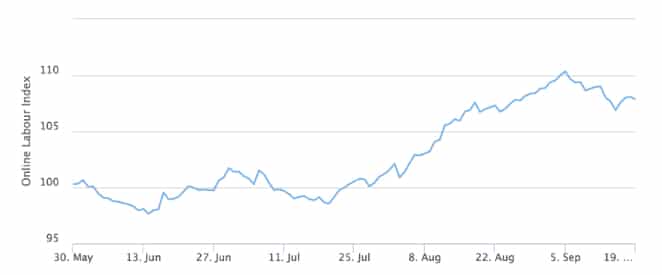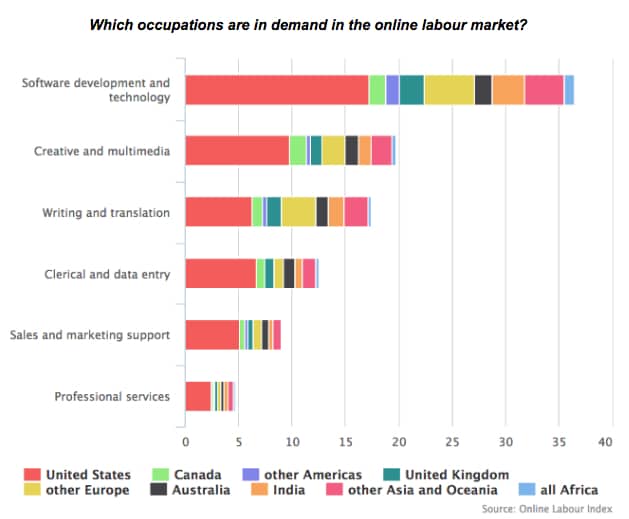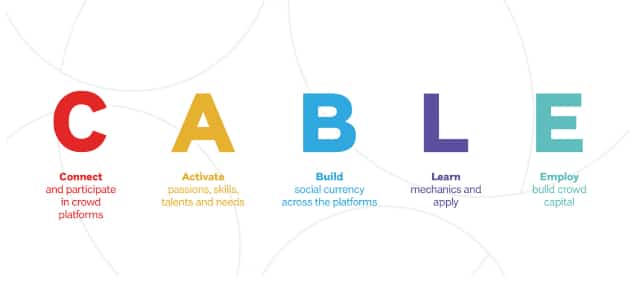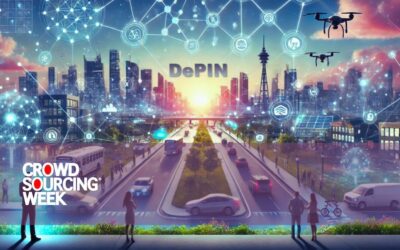The crowd economy represents a profound shift in the way we think about work – a shift that’s already well underway.
According to research by the Foundation for European Progressive Studies (FEPS) and UNI Europa, around 11% of online adults in the UK aged 16-75, equivalent to up to five million people, are being paid for work through online platforms like Upwork, Uber and TaskRabbit. A further one in five (21%), equivalent to around nine million people, have used online platforms to seek paid crowd work. While more than a quarter (26%) of the crowd workers interviewed for the survey also earned more than half of their income through online platforms.
There are other indicators that show the crowd economy is on the rise. The Online Labour Index (OLI) measures the utilization of online labour across countries and occupations by tracking the number of projects and tasks posted on platforms in real time. The graph below plots the Online Labour Index from May to September 2016. During this period the index grew by about 9 points (9%), which represents an annual growth rate of 25% – very rapid growth for a labour market.
Source: Kässi, O. & Lehdonvirta, V. (2016) Online Labour Index: Measuring the Online Gig Economy for Policy and Research.
Paper presented at Internet, Politics & Policy 2016, 22-23 September, Oxford, UK. http://ilabour.oii.ox.ac.uk/online-labour-index/
Around 54 million Americans also now class themselves as freelancers (34% of all workers in the US), and according to a recent paper by economists Alan Krueger and Larry Katz, the number of workers in “alternative [employment] relationships” also increased from 10% of the workforce in 2005 to 15% of the workforce in 2015 – a jump of nearly 10 million people. While in the UK, there has been a 140% increase in over-65s running their own business since 2000, according to a report by the UK Department for Work and Pensions.
Freelancers are often able to set their own hours, giving them a much greater degree of flexibility and independence. Today, it’s perfectly possible to combine several different income streams – you can be an artist who’s also a nanny and graphic designer, or a web developer who also does some gardening. For young creatives, this can be a neat means of supporting themselves while they learn their craft: they can fine-tune their workload to suit the demands of their art, or seek out risky opportunities that might improve their portfolio without forgoing a regular income. For older people, it’s a great means of topping up their pension or providing a useful service even when they’ve retired from their ‘career’ role.
Source: Kässi, O. & Lehdonvirta, V. (2016) Online Labour Index: Measuring the Online Gig Economy for Policy and Research.
Paper presented at Internet, Politics & Policy 2016, 22-23 September, Oxford, UK. http://ilabour.oii.ox.ac.uk/online-labour-index/
The growth of the crowd economy also means we no longer need to rely on one organization or employer for our income. However, that’s not to say big companies aren’t also tapping into the power of the crowd: IBM, Cisco, SAP, Pepsi, Google and HP hire tens or hundreds of thousands of freelancers, who often make up between 20-50% of the total workforce population.
Tools like Facebook at Work can help co-workers around the world connect and collaborate using familiar Facebook features such as News Feed, groups, messages and events. Rather than having friends as your audience, you create and join groups with your coworkers to be a part of relevant conversations, reducing the need for phone conversations and reliance on a company intranet.
Google have also put some serious thought into the kinds of tools, skills and environments people need to flourish at work. As the introduction to their re:Work project points out: “We should expect more from work. People spend more hours working than anything else. But for too many, work isn’t fulfilling, inspiring, or anything more than a means to an end.” Re:Work aims to redesign it to make people happier, healthier, and more productive. How? By putting employees first, trusting them and treating them like owners, and using data to drive people decisions.
While a freelance, nomadic work life certainly has its perks, there are also sacrifices – i.e. sick pay, holiday pay, a company pension and other benefits. One solution could be portable benefits that employers and platforms pay into whenever someone is hired for a task. Every employee would then have access to a pot of paid leave or sick pay, no matter how many employers or income streams they have. If combined with a Universal Basic Income, this would make it very difficult for any employer to exploit someone, and protect the workforce from the growing impact of automation.
I feel we all need to ask more fundamental questions about the nature work: What is it? What do we value? How can we ensure everyone benefits from it? That’s something I hope our upcoming C.A.B.L.E. methodology will encourage both young and older workers to do. It’s based around five key skills these workers will need to master to prosper:
Ultimately, I believe the millennials and over 65s who will thrive in the crowd economy will be those who’re able to think critically and creatively, and apply their talents to a range of tasks. Or to quote the futurist and author Alvin Toffler, “The illiterate of the 21st century will not be those who cannot read and write, but those who cannot learn, unlearn, and relearn.”
Join me at Crowdsourcing Week Europe 2016, November 21-25th in Brussels, to find out more about the future of work, education and entrepreneurship.








0 Comments